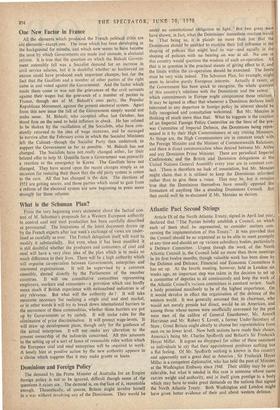One New Factor in France
All the elements which produced the French political crisis are old elements—except one. The issue which has been developing in the background for months, and which now seems to have become the issue by which Governments are made and unmade, is electoral reform. It is true that the question on which the Bidault Govern- ment ostensibly fell was a Socialist demand for an increase in civil service salaries, but it is doubtful whether so hackneyed an excuse could have produced such important changes, but for the fact that the Gaullists and a number of other parties of the right came in and voted against the Government. And the factor which made them come in was not the grievances of the civil servants against their wages but the grievance of a number of parties in France, though not of M. Bidault's own party, the Popular Republican Movement, against the present electoral system. Apart from this new issue the fall of the Government simply would not make sense. M. Bidault, who accepted office last October, has stood firm on the need to hold inflation in check. He has refused to be shaken by the vacillations of the Socialists, who have con- stantly' returned to the idea of wage increases, and he managed to survive after the February crisis in which the Socialist Ministers left the Cabinet—though the Socialist Party then undertook to support the Government as far as possible. M. Bidault has not changed. The Socialists have not really changed either, for their belated offer to help M. Queuille form a Government was primarily a reaction to the emergency in Korea. The Gaullists have not changed. They have seized upon the recent changes simply as an occasion for restating their thesis that the old party system is rotten
to the core. All that has changed is the date. The elections of 1951 are getting nearer, and those parties which stand to gain from a reform of the electoral system are now beginning to press more strongly, for those reforms.














































 Previous page
Previous page